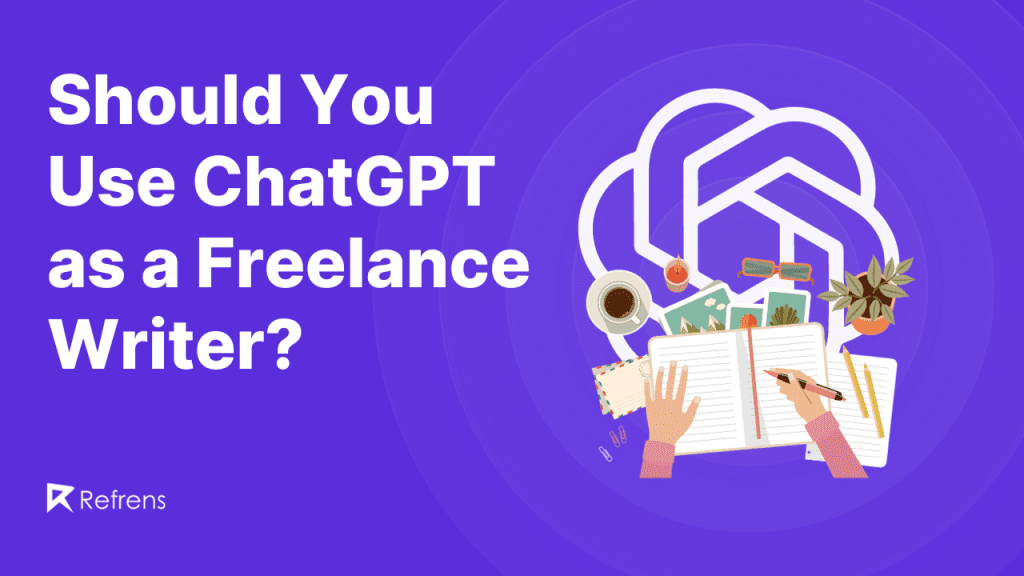Since OpenAI launched the beta version of ChatGPT in November 2022, people have been talking about it. With the proper prompt, the AI chatbot provides seemingly credible responses to almost any query.
Many businesses rushed to leverage the tool, but it hasn’t always panned out. Closer inspection would reveal inaccuracies, sometimes downright inventions. While OpenAI has continuously upgraded the software, one study finds a deterioration in accuracy instead of an improvement in later iterations.
Nevertheless, freelance writers should use ChatGPT up to a point. The tool can be helpful when writers use it ethically.
What is ChatGPT?
ChatGPT is a chat software developed by OpenAI designed to provide text responses that provide human-like text responses. To illustrate it best, here is the tool’s answer to the question, “What is ChatGPT?”
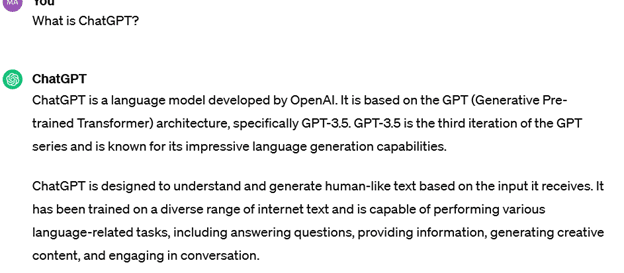
GPT is a neural network model using the transformer architecture. It is a critical factor in advancing artificial intelligence (AI) technologies, enabling overlying applications to be more human-like. Software companies can use GPT to automate many tasks, including translation, code writing, and content creation, and do them faster than humans. Additionally, app development using AI allows companies to accelerate the creation of innovative applications, enhancing both productivity and functionality.
ChatGPT 4.0 is the latest iteration of the software, available only in paid plans for $20 a month. However, ChatGPT 3.5 is freely available to anyone needing a little help with content generation.
How should freelance writers use ChatGPT?
Freelance writers generate income from what they can produce for clients. The faster they work, the more they make. Some writers may rely on productivity tools to keep them on track, but there are other ways. One is ChatGPT, which can provide shortcuts for the time-consuming aspects of content creation.
Some prefer using AI chatbots that can assist them with generating ideas, outlines, and alternative phrasing.
Generate outlines
Most writers spend considerable time researching and creating an outline for a topic, especially for unfamiliar ones. Many also struggle with the introduction, which will set the tone for the rest of the article.
You can use ChatGPT to prime the pump. It can create the initial draft and outline of an article you want to write, saving you from writer’s block and much hair-pulling. You can also use it to augment an existing outline for angles or details you may have missed.
Some people wonder why they should not use ChatGPT to generate the entire article. After all, ChatGPT can generate content up to 4,000 words. While that sounds like a great idea, copying and pasting ChatGPT-generated content to your document verbatim would be a mistake.
For one thing, you will come up against the various checkers that many publishers use to root out AI-generated content. While Google disclaims discriminating against AI-generated content in its search rankings, we’re unsure. As a result, lifting ChatGPT content can result in the rejection of your article or worse. Writers can use AI humanizer to turn ChatGPT generated text into engaging and humanized AI text.
For another thing, the accuracy of ChatGPT content is questionable. You must fact-check everything it produces, which might take longer than writing the article yourself.
In other words, use ChatGPT to start, but do research and write the content yourself.
Generate ideas
Some clients provide topics and instructions for freelance writers, which makes it easy to create content to their satisfaction. However, others are less specific. They may give a peg, keyword, URL, or general topic, and that’s it. The writer must develop a relevant article based on very little information.
In that case, ChatGPT can help by generating topic ideas. With the proper prompt, you can ask it to provide titles, suggest subtopics, and explore various angles to a general topic. The goal is to stir your creative juices and provide inspiration.
Suppose the client wants an article on student loan refinance in the US. You can ask ChatGPT to provide titles based on that topic. You might get something like this:
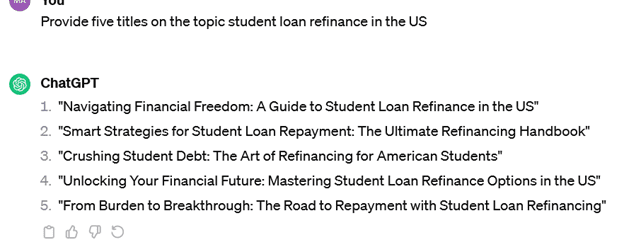
Generate alternative phrasing
Freelance writers typically have a distinctive style and form of expression that define their work. However, it may sometimes be necessary to break out of the mold.
For example, suppose a writer has an informative, dry style expressed in the third person. However, the client requests a conversational article from a first-person point of view. ChatGPT can help rephrase what the writer would typically say in the preferred style; alternatively, a dedicated text rewording tool can achieve the same result with finer tone controls.
Using the previous paragraph as an example, this is what ChatGPT provided:
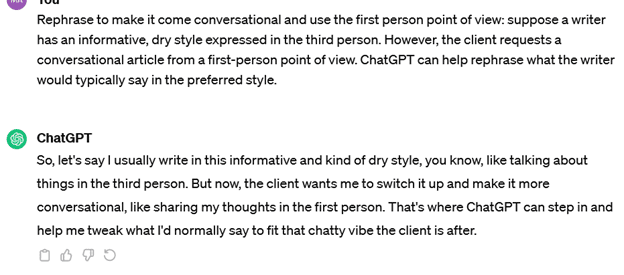
Writers can also use ChatGPT to break down a complex statement to make it easier to understand. For example:
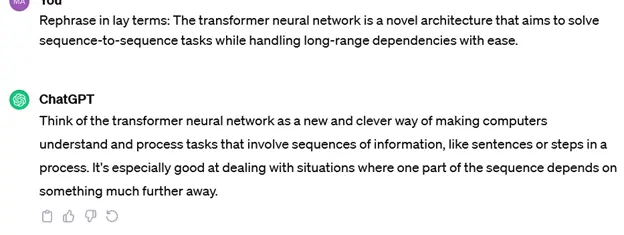
Finally, you can use ChatGPT to cut up long sentences to improve the readability of your content. For new freelance writers, keeping each sentence to 20 words or less is a good rule of thumb. ChatGPT can shorten lengthy sentences without affecting the meaning or flow. It might do this by cutting them up, eliminating wordy phrases, or removing redundant words.
Generate grammatically correct content
Most writers use Grammarly or other writing tools to proofread and grammar-check their work before they submit it. However, these tools do not catch everything. ChatGPT can supplement whatever software you use to check your content. If you ask, it will also give suggestions for improving your article’s flow and readability. If you often need to quickly produce structured responses to specific questions, an AI question answer generator like this one can be a time-saver. It delivers instant, AI-based answers that you can expand and refine into original content. For example:
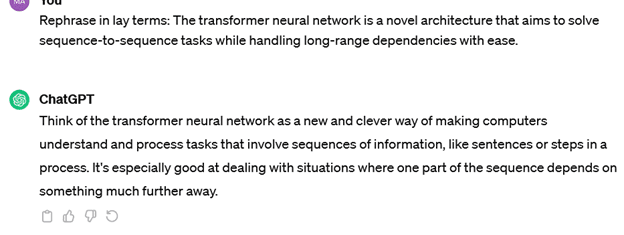
Generate social media posts
Freelance writers create various content, including product descriptions and social media content. ChatGPT can create exciting content based on the target audience and purpose. For example:

Generate emails for marketing
Email marketing remains an effective strategy for businesses despite being around for a long time. However, creating content can be challenging. Many factors come into play when composing compelling emails, and ChatGPT can help. It can suggest catchy subject lines and incorporate all your desired information in a well-crafted email. For example:
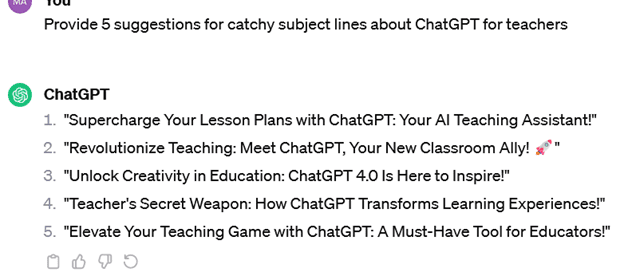
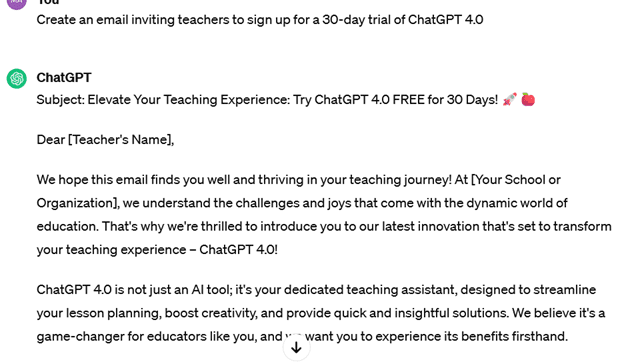
Generate a summary
Have you ever encountered long passages from a research paper or article that you needed to distill into one paragraph? ChatGPT is a whiz at summarizing the main points of a block of text and presenting it in an easily digestible number of words.
Sometimes, you need to find critical information from research papers. ChatGPT cannot do that, but you can sign up for ResearchGPT with a paid account. When you upload a link to a PDF or the PDF itself, it will absorb the information and answer any question based on that.
Generate research ideas
Online research is critical for freelance writers and takes a lot of time. ChatGPT can provide ideas of where to find relevant articles. However, the research features of the tool are limited to its latest update (currently January 2022), and it does not always provide helpful links. Sometimes, all you get is a 404 error message. Nevertheless, it doesn’t hurt to ask when you are at your wit’s end.
Generate examples
Sometimes, clients ask their freelance writers to provide examples in their content. For example, the client asks you to write an introduction to JavaScript Object Notation (JSON) for non-coders. You can tell ChatGPT to provide an example to explain it visually. You will get something like this:
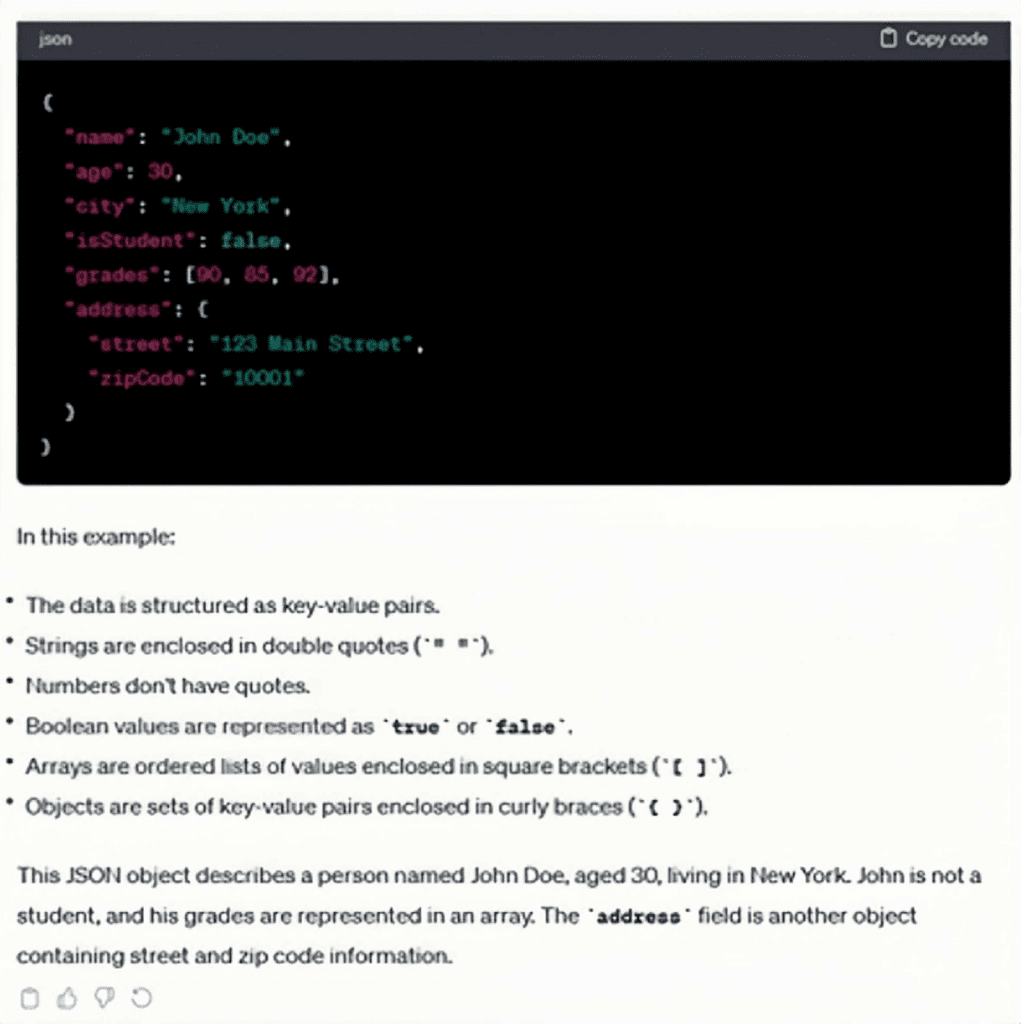
Pretty neat, huh? While readers may not be able to write code, they will have no trouble understanding the concept because of ChatGPT’s example.
Generate marketing content
Do you think ChatGPT is only useful for completing assignments? You can also use it to generate marketing content for your business. Most freelance writers depend on gig marketplaces and search engines to get clients, which means getting their attention. You can use ChatGPT and SEO marketing tools to reach the top spot in searches.
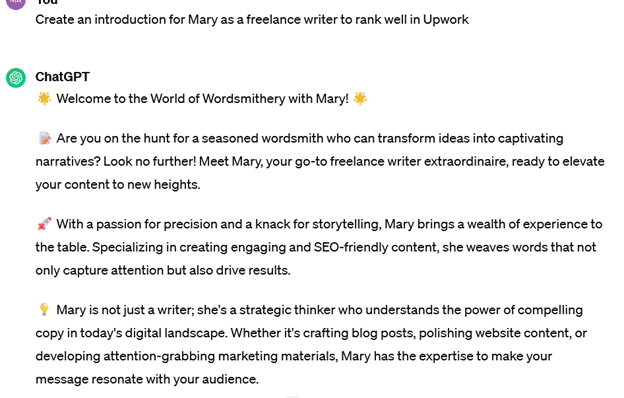
What You Shouldn’t Do With ChatGPT
Now that you know how to use ChatGPT as a freelance writer, find out what you shouldn’t do.
Taking it on faith
Whenever you ask ChatGPT for information, you should always cross-check. As mentioned earlier, ChatGPT can be wrong. You should understand that it relies on patterns, not facts, to generate responses. Sometimes, the data it has is incorrect, outdated, or non-existent. In that case, it will give you an answer that sounds right but isn’t.
As a freelance writer, you must ensure the information you provide is accurate. Use ChatGPT as a jumping-off point, but always refer to reputable sources to verify the accuracy of its responses.
Assuming it is original content
ChatGPT generates responses that are generally plagiarism-free. However, you cannot assume that. There is always the risk of unintentional plagiarism, so run it through a plagiarism checker. You can also use an AI rewriter to refresh the sentences and add your own touch. This helps keep the final version unique. You should also customize the content to ensure it is unique.
Asking it to solve math problems
ChatGPT can be as bad as math as most people because data scientists have not trained the software to solve math problems. It might be able to add one plus one, but anything too complex might result in a false answer. Don’t depend on it to do your math homework for you or any clients asking you to do it for them.
The same applies to logical questions. ChatGPT might provide you with the wrong answer and make persuasive arguments to support it. In the following question, ChatGPT provided a credible-sounding but incorrect conclusion:
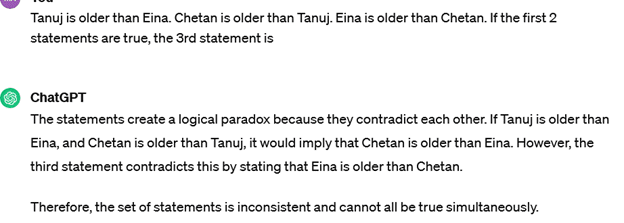
ChatGPT failed to follow the logic and did not provide an answer. As you can see, the statement provided that the two statements are true. Therefore, the third statement is false.
Of course, you may never encounter a scenario where you must solve a logical question as a freelance writer. Nevertheless, don’t ask ChatGPT to solve it for you if you do. Instead, you can use a math word problem solver that will help you break down the problem and find the correct solution.
Providing personal information
ChatGPT is a learning software, so any data you provide will go into its database. Anyone with access to that database, authorized or not, may use that information. Providing personal information can expose you to hackers.

Is it worth getting ChatGPT Plus?
Freelance writing can be a profitable career, but it does entail investing in some tools that require payment. Most freelance writers have a paid version of tools like Grammarly or Copyscape, as a matter of course. Given the usefulness of ChatGPT, would it be worth paying $20 monthly for the paid version?
The answer is it’s complicated. ChatGPT Plus includes many features not available with the free version, including access to GPT 4.0. It also has beta versions of features such as web search and plugins that allow it to connect to the Internet. The value of that is it counteracts the training cut-off limitations, meaning it gets access to more recent information. The training cut-off for the free version is January 2022.
However, the free version provides enough assistance for most freelance writers that getting the paid version might not make sense. That might change as the software becomes more sophisticated. You might want to put off laying down $20 a month unless you’re getting paid big bucks. In that case, your rates might justify taking a leap of faith.
Leveraging ChatGPT as a Freelance Writer
Freelance writers should use ChatGPT to the fullest extent possible to help them do better work and make more money. However, they should understand that there are practical and ethical considerations when using the software.
ChatGPT is a robust tool that can do a lot of good when used correctly and a lot of harm when not. On one hand, it can make you a more effective writer and boost your productivity. On the other hand, it can harm your reputation as a quality content creator and even expose you to penalties for plagiarism.
Overall, ChatGPT presents a unique opportunity for freelance writers to use artificial intelligence to their advantage. It can be a valuable resource to help the circumspect writer stay at the cutting edge of content creation.

